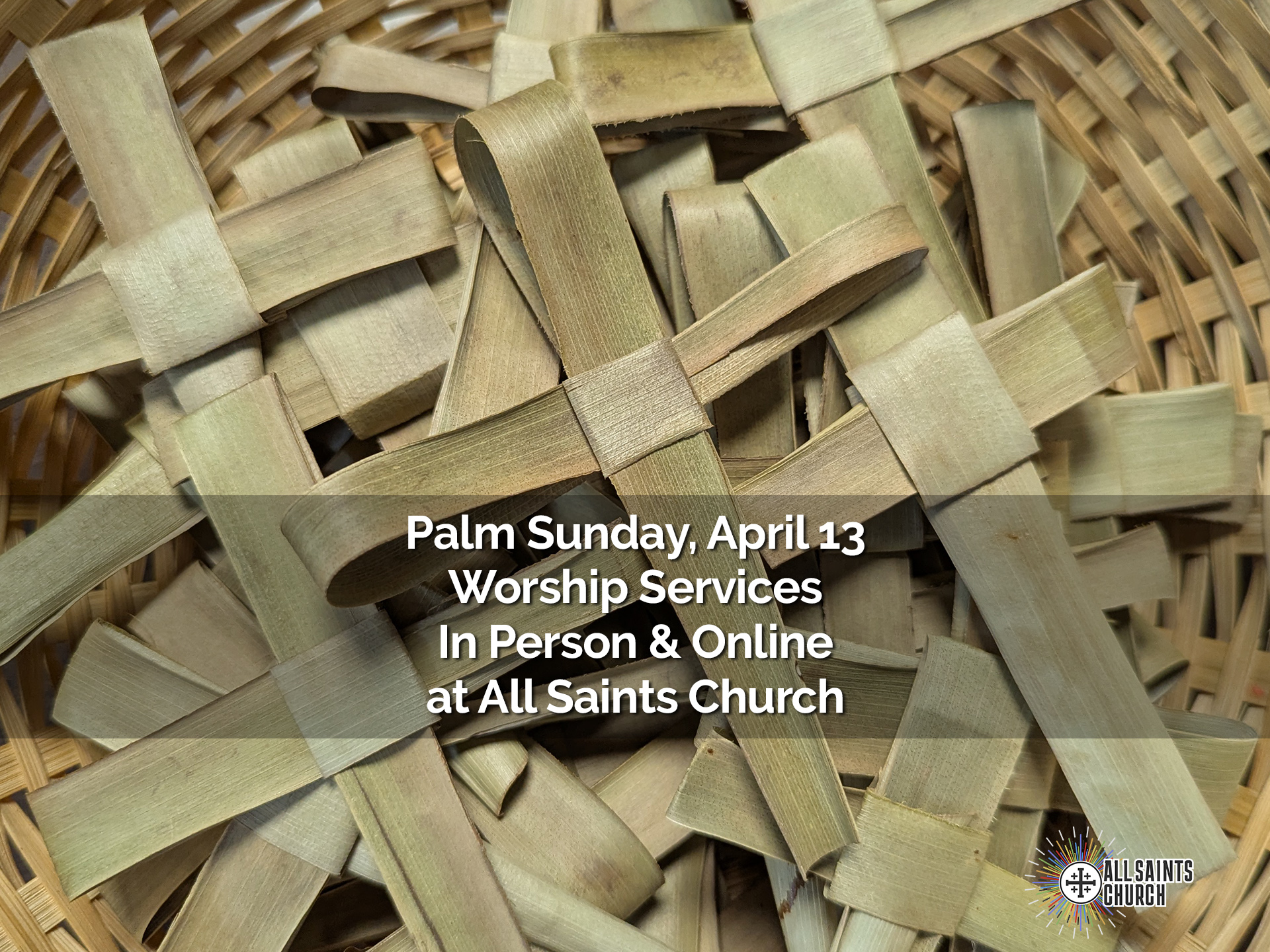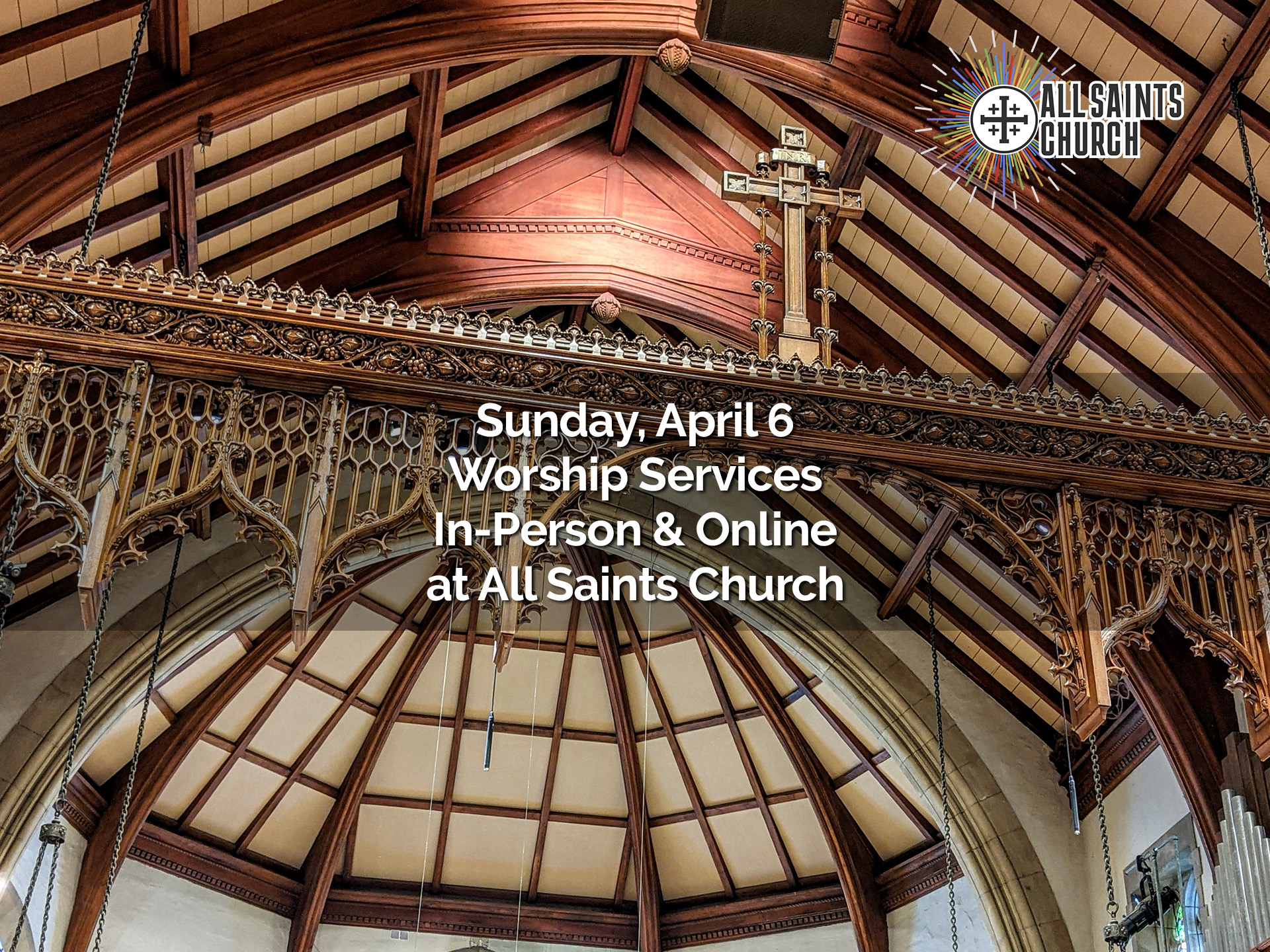The Gospel isn’t meant to be gulped down on Sunday morning, but gnawed on through the week so it really becomes a part of us. You’ve got to work at it, like a dog with a good bone! Here’s the Gospel for this coming Sunday — the Third Sunday in Lent with food for thought from All Saints’ Rector Mike Kinman. Gnaw away!
John 2:13-22
Since it was almost the Jewish Passover, Jesus went up to Jerusalem.
In the Temple, he found people selling cattle, sheep and pigeons, while moneychangers sat at their counters. Making a whip out of cords, Jesus drove them all out of the Temple – even the cattle and the sheep – and overturned the tables of the moneychangers, scattering their coins. Then he faced the pigeon sellers: “Take all this out of here! Stop turning God’s house into a market!” The disciples remembered the words of scripture: “Zeal for your house consumes me.”
The Temple authorities intervened and said, “What sign can you show us to justify what you have done?”
Jesus answered, “Destroy this temple, and in three days I will raise it up.”
They retorted, “It has taken 46 years to build this Temple, and you’re going to raise it up in three days?” But the temple he was speaking of was his body. It was only after Jesus had been raised from the dead that the disciples remembered this statement and believed the scripture – and the words that Jesus had spoken.
The Backstory – What’s Going On Here?
We’re used to associating this story with the end of Jesus’ life, because that’s where we find it in the synoptic Gospels (Matthew, Mark and Luke). There it happens right after Jesus’ triumphal entry into Jerusalem, which we celebrate on Palm Sunday. But John is different. John puts this at the beginning of Jesus’ ministry – immediately following Jesus first sign … the miracle of turning water into wine at the wedding feast in Cana.
Why does John put this so early? Some argue that this is a different episode of cleansing altogether. Also, John’s chronology is different … while the other Gospels mention only one Passover, John’s Gospel mentions three separate ones.
But with John we always have to go back to the central question that undergirds the whole Gospel. John’s community has just lived through the destruction of the Temple, which they had always believed was the dwelling place of God. This created an extreme crisis. Where was God? Was God even there anymore?
In this story, Jesus identifies HIMSELF as the new temple. That is the hope and salvation now. Not a structure of stone that can be torn down (and had been three times), but an indestructible resurrected Christ that was present in the gathered community. And this Temple is not about generating profit off the backs of the people, but about liberating the people from all that binds us.
A few things to chew on:
*The moneychangers were part of the Temple’s economic system … one not too different from the company store for an indentured servant. People had to have an “unblemished animal” for the appointed sacrifice. You could bring your own, but it was up to the judges to decide if an animal was worthy, and the only ones that tended to pass muster were the ones bought (at high prices) inside the Temple court. It was a scam. Add to this the fact that this was not the Temple of old built by Solomon or the Second Temple built by Jews returning from the Babylonian exile. This was the Third Temple, and it was built by Herod not for spiritual purposes but for political purposes to unite, control and essentially tax the people. It was a first-century example of what we have seen so much of today and since … politicians using religion, religious language and the church for their own ends — and profiteers doing the same.
*Jesus was not preaching against the sacrificial system. He was a good Jew And, in fact, we hear in Luke of him joining his family on the Temple pilgrimage and engaging the priests in conversation. He and his followers even appropriate the sacrificial language to express his own death. But at its heart, the sacrificial system was not about earning individual appeasement from God and it certainly wasn’t about raising money. In its original and highest form it was pure communal sacrifice … the people offering the best that they had to God. But that’s not all … part of the sacrificial rite was also sharing the sacrifice among the people. It was about not only giving up our best for God’s glory but using it in a celebratory feast for the whole community. It is the same theology that
undergirds our own stewardship and Eucharistic thought. What Jesus overturns is the perversion of this for personal and political gain. What would Jesus say about our church today?
Try This:
And love is not the easy thing
The only baggage that you can bring
Is all that you can’t leave behind
-U2, Walk On
The people of Israel were in crisis because the Temple was gone … and because they believed that they needed the Temple to have God present with them. In this Gospel, Jesus shakes them up and shifts their focus. It’s not the Temple, he said. The Temple is nothing. All you need is me. God is present right here, right now … in me.
Over and over again, Jesus tells his disciples that in order to follow him they must leave everything else behind. To not think in terms of ownership anymore. To think in terms of self-giving love. Love is not the easy thing. And it can’t be done if we’re loaded down with lots of baggage.
This week spend some time at the beginning of this day thinking about what you have, what you OWN. What would it be like to give it up? Or even are you using it to love the world … or even to love the people in your house? What is the difference between ownership and stewardship in your life … and in our life as an All Saints community? And then pick one small thing to give away each day as a sign that all we think we HAVE is really
God’s … and we get to use it to love God and each other.
I said, “Whose House?” …
“God’s House!”
“Stop turning God’s house into a market!”
One of the great joys of following Jesus is the invitation to HAVE less and BE more. It is an invitation that feels ike sacrifice, but it is really about liberation.
HAVE indicates ownership. That what I HAVE is mine or ours. Which means it is not yours or theirs. HAVE is about exclusive right and control of. HAVE is about possession. I think this is might be what Paul means when he talks in Philippians 3 about suffering the loss of all things and regarding them as rubbish “in order that I may gain Christ and be found in him, not having a righteousness of my own that comes from the law, but one that comes through faith in Christ.”
Does this mean that we should go around naked because we are completely without anything material in our lives? No. But I do think this is one of those really hard narrow gate places where we need to remember and live not by an ethic of ownership but by an ethic of stewardship. I also think this is one of those ethics where the extreme really is the highest virtue … and most, if not all of us fall short of that.
An ethic of stewardship instead of ownership is embodied in “[4]when someone asks for your coat, give them your cloak as well.” It is recognizing that we don’t OWN anything but we are given the opportunity to
be stewards of great abundance. And our task and joy is to steward the abundance for the good of all.
It might seem like a ticky-tack semantic point, but I think it’s HUGE! A question we are perpetually dealing with at All Saints – and every church — is this question as it relates to this Gospel:
Whose house is the church?
Take two different attitudes:
1) All Saints Church is OUR building. We own it.
2) All Saints Church belongs to God. We have been charged with caring for it for the good of the people of this congregation, the diocese and the city of Pasadena and Los Angeles and beyond.
In practice, there is a HUGE distinction between these two things.
Ownership inevitably leads us down the path of protecting what we believe is ours, creating constructs of us and them, and eventually valuing property over people. . Stewardship leads us into self-giving love, which is the heart of the Gospel. It is through embracing stewardship instead of ownership that we become the body of Christ.
That’s what Jesus means when he says it is easier for a camel to go through the eye of a needle… (you know the rest) and “where your treasure is…” (ditto). That if we HAVE less, we can BE more.
So whose house is it? It’s God’s house. And it is our joy not to possess it and profit from it but to care for it and use it and even give it away for those whom God loves.
We don’t want to HAVE the church. We want to BE the church … which is much, much more.
. . . . . . . . . . . . . . . . . . . . . .
Check out the rest of Sunday’s readings
The Lectionary Page has all of the readings for this Sunday and every Sunday.
Collect for Sunday
Pray this throughout the week as you gnaw on this Gospel: Almighty God, you know that we have no power in ourselves to help ourselves: Keep us both outwardly in our bodies and inwardly in our souls, that we may be defended from all adversities which may happen to the body, and from all evil thoughts which may assault and hurt the soul; through Jesus Christ our Lord, who lives and reigns with you and the Holy Spirit, one God, for ever and ever. Amen.
Want to read more?
“The Text This Week” is an excellent online resource for anyone who wants to dive more deeply into the scriptures for the week.
. . . . . . . . . . . . . . . . . . . . .
Gnaw on This is a weekly publication of All Saints Church. To subscribe, contact Debbie Daniels at ddaniels@allsaints-pas.org



